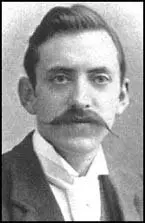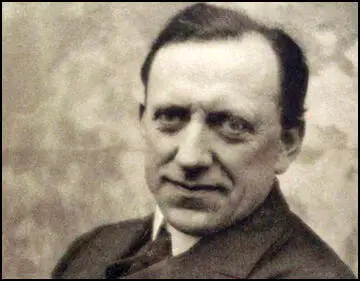James Garvin

James Garvin, the son of Michael Garvin, an Irish immigrant, and Catherine Fahy, was born at Birkenhead on 12th April 1868. His father, a sailor, was lost at sea in 1870.
In 1884 Mrs. Garvin moved her family to Hull where James found work as a clerk. Garvin had been brought up as a Roman Catholic and was a strong supporter of Irish Home Rule. The local paper, the Eastern Morning News, began publishing his letters on the subject.
By 1891 he was contributing articles to United Ireland and later that year he convinced the Newcastle Chronicle to employ him as a proof reader. He also began writing articles without payment but the editor was so impressed with his work that he was taken on as a staff reporter.
Articles on Irish politics by Garvin in the Fortnightly Review brought him to the attention of W. L. Courtney, and in 1899 he was recruited to work for the Daily Telegraph. Garvin became editor of his own newspaper in 1908 when Lord Northcliffe gave him the task of reviving the fortunes of the Observer.
Although he had originally been a supporter of the Liberal Party, Garvin was now a Conservative and he led the campaign to persuade the House of Lords to reject Lloyd George's budget proposals. Viscount Astor became the sole owner of the Observer in 1911 and Garvin agreed to edit his other paper, the Pall Mall Gazette (1912-1915).
After the outbreak of the First World War, Garvin argued for a more dynamic government and advocated David Lloyd George should replace Herbert Asquith as prime minister. Garvin's only son, Gerald Garvin, was killed in the war.

A fierce critic of the Treaty of Versailles, Garvin wrote The Economic Foundations of Peace (1919) where he suggested a new world partnership under the League of Nations. His view that Germany should be granted equal status with other European countries was unpopular with the general public and was unacceptable to David Lloyd George.
As well as working for the Observer, Garvin also edited the fourteenth edition of the Encyclopaedia Britannica (1929).
In 1931 Garvin supported Ramsay Macdonald and his National Government. In the 1930s Garvin argued for rearmament but also was an early supporter of appeasement.
A disagreement with Lord Astor in 1942 resulted in him leaving the Observer. Over the next few years he wrote for the Sunday Express (1942-1945) and the Daily Telegraph (1945-1947).
James Garvin died on 23rd January 1947.
Primary Sources
(1) Katharine Garvin, J. L. Garvin (1948)
My father had no illusions about the character of Wilhelm II; and the Kaiser had, reading through or hearing of English periodicals, recognised him as an adversary under one of his political pseudonyms. Garvin had preached that war was inevitable, and that the possible outcome of German conquest and domination would be disastrous to European development.
(2) James Garvin's son, Gerard Garvin, had just won a scholarship to Christ Church, but instead chose to join the South Lancashire Regiment in 1914. Katherine Garvin wrote about it in her book, J. L. Garvin (1948)
My brother was to have gone to Christ Church, where he had won a scholarship. He could have gone there without reproach, for he was very young. He wanted to go to war. My father was trying to get a commission for him in the Irish Guards, but the boy grew tired of waiting, and enlisted with his friends, in the South Lancashire Regiment.
My brother was killed on July 23rd, 1916, at Bazentin-le-Petit in the Battle of the Somme. The story that I tell is only a story, and I cannot vouch for the facts. Week after week in the Observer, my father thundered for parents to let their sons go. It was honour with him that his own should not be sheltered. My brother was wanted on the staff, and was in fact called to a staff appointment a short time before he was killed. But his best friend in the army, Stewart McClinton, was killed shortly afterwards, and he went back to the trenches. He was under no illusions about what was waiting for him, and very shortly afterwards he was killed, as, from his last letter, he expected to be. "If I die," he wrote, "I couldn't die for a better cause."
The loss of of a son, an only son, is something that no other person can assess. I do not think that anyone, anyone at all, could fully know what that loss meant to my father, and increasingly as he grew older. Only the millions of other fathers who suffered in the same way can realise it. It was always in Garvin's heart; but he could seldom speak of it. At the time of his loss, he was both burdened and sustained by the need for giving comfort to my mother.
As a family, we went through the war keeping the even atmosphere of home life. My father wrote more fiercely, but not more assiduously than before. He put all he had into the cause of the Allies. My mother went to help in canteens; she spent much of her time arguing with tradesman, and making the best of the rations. Many of my parents' young friends were killed; and the relations come to my father for comfort.
My father said long afterwards that he died a thousand deaths for those in the trenches, including his own son. I have no doubt it was true, but he stayed awake night after night, groaning in his half-wakefulness, and evidently living through unimaginable scenes of the battlefield.
(3) James Garvin's wife died shortly after the Armistice. His daughter wrote about it in her book, J. L. Garvin (1948)
We heard of the Armistice the day before it was made public. On Armistice Day itself, she and I went alone to London. I remember her crying and crying through all the rejoicing, and saying: "It is too late for me."
Nearly three months later, she died, in her sleep, after a bad attack of the influenza that had overrun England after the war. She was a war casualty. The doctor had been in the morning, and had said she was better. But at some time in the late afternoon of Christmas Eve, the eve of her forty-third birthday, her heart gave up, and she went.
My father found her as she lay in bed. It was a more terrible thing for him than he had left to her. He was totally incapable of dealing with a large family, house and kitchen; and he felt his loss more and more. Year after year, I saw him break into uncontrollable tears when he mentioned my mother. The grief become more intense with the years, and not less. It was alarming to see him cry, but I learned from it that the more manly, the larger the man, the more he can let his tears flow without false shame.
(4) James Garvin, The Economic Foundations of Peace (1919)
The old battlefields of the Somme, once a picture of lively hamlets, diligent homesteads, sleek cultivation, are now scenes of wild solitude more lonely and sinister than the witches' heath in Macbeth. Other tracts are like them. No man who has traversed them can hope to tell what they are like or what he felt there. Still more paralysing of all expression is the unbelievable sight of the smashed towns - of a once thriving and rising town like Chauny, for instance, which had, I think, 40,000 inhabitants, and is now one nightmare-mass of shattered streets, skeleton walls, bristling wreckage, heaped rubbish, sagging timbers, mouldering wall-papers, and stray rags.

